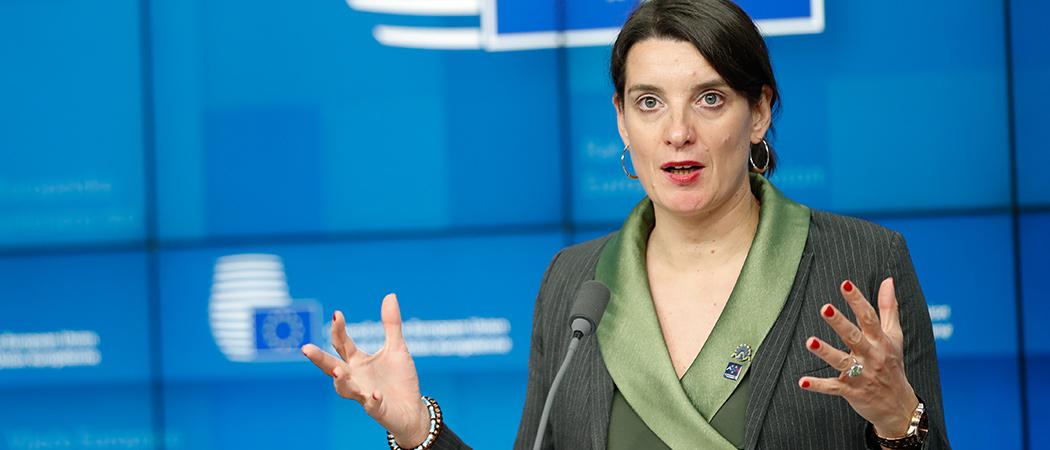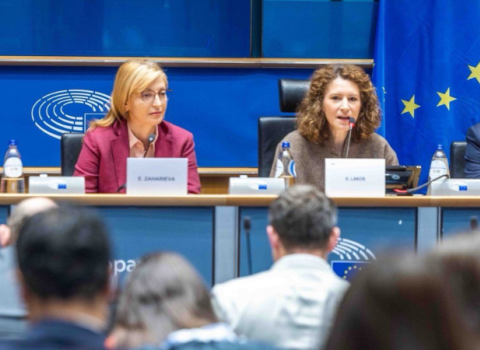Pact approved by the EU Council is intended as the political guide to creating a single market for research. But targets it sets are non-binding and implementation is left in the hands of national governments

Simona KUSTEC, Minister of Education, Science and Sport, Slovenia. Photo: European Union
EU research ministers adopted conclusions on the governance of the European Research Area (ERA) on Friday, after months of haggling with stakeholders over their role and status in setting the policy agenda of the EU’s single market for research.
Ministers also agreed on the pact for research and innovation, which is meant to be a political guide to implementing ERA. It includes a non-binding commitment by member states to reform national R&D systems and boost public and private investments to 3% of GDP. Under the pact, member states are committed to setting common EU principles and values for research and innovation and to agree on shared priorities.
EU research commissioner Mariya Gabriel launched the idea of a pact on R&I back in 2020, in the hope of convincing member states that lag behind the EU average R&D expenditure to increase their total public and private research funding by 50% in the next five years.
Efforts to set up a single market for research in the EU date back nearly two decades, when the Commission first urged member states to raise spending on research and development to 3% of their gross domestic product. But the EU could not make the target a legal requirement and only Belgium, Sweden, Austria, Germany and Denmark had reached it by 2020, according to Eurostat. The EU average of 2.3% is well below the US, Japan, and South Korea.
With the new pact for research and innovation not binding either, R&D investment targets risk being overlooked once more by national governments. However, diplomatic sources in the Council say the political commitment made by member states on Friday puts a little more pressure on national governments and the Commission to finally deliver.
In a press conference after the ministerial meeting on Friday, Gabriel called on governments to put research and innovation “at the very heart” of all their policies. “I am glad that member states have heeded the Commission’s suggestion to speed up the achievement of the 3% target,” she said. “We need to invest more; we need to invest better.”
Some member states have already started reforming their R&D systems and have drawn up budget forecasts that include rises for research funding, but other countries are lagging, with some still struggling to get their public investment in R&D above 0.2% of GDP.
In an interview ahead of the research ministers’ meeting, Slovenia’s research minister Simona Kustec said she was able to push for a new national law on research and innovation last week, which sets a minimum public spending target of 1% of GDP, and establishes a consultative body bringing together national stakeholders to debate future priorities for research.
The new law is meant to show that with the right political commitment, the new ERA targets are achievable. “As small country, we found knowledge and research education is one of the most fundamental tools which we can have,” Kustec said.
Slovenia is about to end its stint at the helm of the Council of the EU, but Kustec said its successor France will pick up the baton. “ERA reform is completed, and our friends can focus on implementation solely,” said Kustec.
ERA governance
The agreement on the ERA governance on Friday was expected, given member states had already agreed on the headline items. All that was left was some last-minute haggling over what role research and innovation lobby groups play in shaping the ERA policy agenda.
According to member state officials familiar with the talks, it was difficult to reach consensus on how these stakeholders will get to participate.
Most stakeholders were pleased with how member states have shifted their stance over the past couple of months to allow research, university and industry associations to be part of ERA’s governance framework.
Last month, sixteen research and higher education organisations wrote an open letter calling on the European Commission to ensure they are represented in the ERA Forum. The letter settled some diverging positions among stakeholders, but the League or European Research-Intensive Universities (LERU) did not sign it.
Stephane Berghmans, director for research and innovation at the European University Association, told Science|Business the outcome of the Council negotiations could have been better, but it gives organisations a starting point for deeper engagement in the future. “It’s not enough, it’s not what we asked for, but it is satisfactory,” said Berghmans.
LERU is still unhappy with the end result. In a statement published ahead of the ministers meeting on Thursday, it decried the failure to give research stakeholders permanent seats and votes in the ERA Forum, the body that will establish the policy agenda and decide on actions needed to foster a single market for research.
Instead of permanent seats, stakeholders will be invited to “relevant meetings” of the ERA Forum, and it will be up to them to find a system for appointing representatives.
“I've heard that there are a couple of groups where this internal representative voice is going to be an additional challenge for them, but I'm more than sure that they are going to be able to manage this,” said Kustec.
Each of the 27 member states will have one representative in the forum, while the Commission will have one representative.
This setup will allow university, research and business associations to join the Commission and member states in shaping specific policy actions in ERA. However, they will not automatically take part in talks to establish the overall ERA policy agenda. For this process, member states wanted to have a closed-door political debate before opening the discussion to stakeholders.
University associations are already coordinating their involvement in the ERA forum, but Berghmans said “the door is open” for LERU. “We would love to see them join.”
According to the agreement rubberstamped by member states, the topics and the degree to which stakeholders will be involved in setting the ERA policy agenda depends on the judgement of the ERAC, a group of policymakers representing national governments and the European Commission.
ERA priorities and reforms
Even if the governance issues have been put to one side, “that does not mean we are satisfied with where is ERA going so far,” said Berghmans.
Further political commitment is needed to make sure as many member states as possible work towards the goals set in the policy agenda, from reaching the 3% of GDP investment target, to more intricate topics such as research assessment.
The ERA reform includes a plan to revamp Europe’s research assessment system by which research and academic careers are evaluated. At the moment, researchers and university teaching staff are largely evaluated based on their publication record and journal impact factors. In addition to the traditional metrics, a reformed assessment system would also reward open science practices, engagement with society and collaboration with industry and the public sector.
“We are still concerned about the level of commitment [on research assessment],” said Berghmans. “It’s not at all feasible if member states do not commit.”
"A reform of research assessment is a prime example of why stakeholders need to be involved in ERA,” said Berghmans.
The Commission tried to persuade a few member states to join a coalition of those willing to begin applying new assessment criteria. Some countries are of the opinion that is trying to move too quickly forward and that stakeholders should form a sub-group in the ERA Forum to unpick the implications on the ground for such a reform.
In the new ERA, member states, stakeholders and the Commission adopt and implement principles of open science, and deploy the European Open Science Cloud, so that research data produced in the Europe is interoperable.
A truly functioning internal market for research also requires EU copyright and data legislation for research to overcome barriers to accessing journal papers and research data stemming from projects funded with taxpayers’ money.
And finally, member states should agree on a common framework for research careers that would create better career opportunities across the EU, not just in a few rich countries.
The Commission the new ERA policy agenda will encourage member states to work more closely with the Commission on improving research careers, retaining top talent and setting common research priorities. “We need to draw a strong communication strategy to highlight the value of ERA,” Gabriel said.





 A unique international forum for public research organisations and companies to connect their external engagement with strategic interests around their R&D system.
A unique international forum for public research organisations and companies to connect their external engagement with strategic interests around their R&D system.